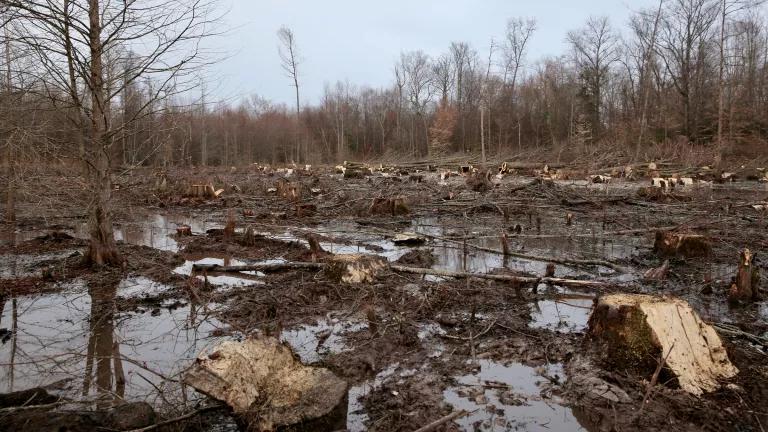130+ Organizations Urge Accountability on Forest Protection
In a joint statement to international leaders, groups from around the world call for global accountability as essential to delivering on forest commitments.
.jpg.jpg?h=265e640d&itok=Fhdu4sb6)
Since its creation in 2012, International Day of Forests has been a celebration of transformation. Landing on March 21st each year, it coincides with a moment of impending change, as the world’s forests prepare for their most dramatic annual transitions—the imminent verdure of spring in the north and technicolor of fall in the south. It’s a time of global inhalation, of a world poised to move forward into a new moment.
That potential for transformation also defines the state of global forest policy as the international community celebrates this year’s International Day of Forests. Following unprecedented policy commitments and actions by the financial and corporate sectors, the international community stands at the threshold of meaningful forest protection.
Achieving that change, however, depends on more than what’s on the page. That’s why, this International Day of Forests, organizations from around the world are calling for a long-overdue element in global efforts to curb deforestation and forest degradation: accountability.
In an International Day of Forests statement, more than 130 organizations from 39 countries, including BirdLife International, Greenpeace, Amnesty International, and Climate Action Network Canada, have urged international changemakers to prioritize accountability as foundational to meeting global commitments. Calling for a “shared, equitable sense of responsibility and a commitment to truly global progress,” the statement highlights the need to establish accountability mechanisms that will drive timely, effective action.
The statement lauds recent “groundbreaking” policy developments, like the outcome of the UN climate conference in December, but warns that, without accountability, the recent progress will become simply the latest in a longstanding legacy of failed commitments and half measures—particularly from the Global North—that has defined forest policy for decades.
Last December, at the annual UN climate conference, the international community agreed to a climate roadmap that embraces the necessity of halting and reversing deforestation and forest degradation by 2030, a goal also enshrined in the Glasgow Leaders’ Declaration on Forests and Land Use. The roadmap, called the Global Stocktake, embeds in climate action the unequivocal reality that keeping the forests we have standing is essential to achieving a safe and livable future and sets a nonnegotiable target the world needs to hit.
Some governments have already made strides toward delivering on this goal. The European Union is advancing trade standards that address sourcing tied to deforestation and certain types of forest degradation. The United States has announced measures for protecting old-growth forests. Nigeria is leading on the implementation of biodiversity protections and the pursuit of equitable progress internationally.
Others, however, continue to sign international agreements with one hand while weakening them domestically with the other. Northern countries like Canada and Sweden have, for decades, helped to craft an international policy framework focused almost exclusively on deforestation in the tropics, erasing the fact that industrial logging in northern countries is the single largest driver of tree cover loss in the world, with devastating climate and biodiversity consequences. Reinforcing the northern logging industry’s claims, governments in the Global North market their forestry practices as “sustainable forest management,” framing them in stark contrast to the practices in the Global South. This myth has propped up the timber, pulp, and biomass industries of these countries, and not only permitted, but incentivized, the clearcut logging of some of our planet’s last vast carbon storehouses.
Even with their latest commitments, these same governments are using definitional workarounds and lobbying tactics to avoid following through on these agreements in their own backyards.
The effects of this paradigm transcend the Global North; in preserving a system that lets themselves off the hook, northern countries are undermining progress everywhere.
The statement reinforces the recent call for the establishment of a Glasgow Declaration Accountability Framework (GDAF), a mechanism for driving equitable, common progress toward the 2030 targeting of halting deforestation and land degradation. The GDAF, supported by a group of African environment ministers and more than 100 civil society organizations, would create processes and standards to foster and track globally shared progress across both the Global North and the Global South.
This push for global accountability is happening as the economic systems that enable the status quo are beginning to realize the risks inherent in the lack of global accountability, and the opportunities that consistent, clear standards can provide. For example, shareholders of both Procter & Gamble and The Home Depot have overwhelmingly called for these companies to strengthen their sourcing practices to create more upstream accountability.
The international community has the opportunity to chart a different path, this time building the accountability mechanisms that will bring policy from pledges into practice.
The statement serves as a counterpoint to this year’s UN-designated International Day of Forests theme of “Forests and Innovation,” which celebrates the intersection between forests and technology in addressing the climate and biodiversity crises. As the statement warns, however, “Innovation in an accountability vacuum…is not only prone to failure, but dangerous.” Innovation needs to start from a baseline of recognizing what standing forests already offer, and accurately accounting for the cost of cutting them down.
Ultimately, actualizing positive change for forests will come only from revisiting and transforming the underlying latitudes that have stymied decades of commitments. The international policy landscape is bursting with potential and promise. Accountability will be what ushers the world into a new season.




